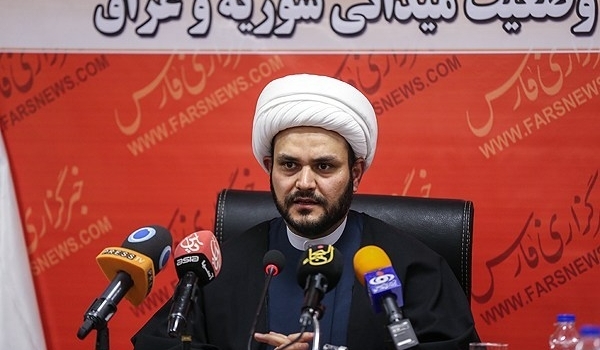
RNA - "We will respond to this crime inside Saudi Arabia and we are able to do what we say," Sheikh al-Kaabi told reporters on Tuesday.
He reiterated that Hezbollah al-Nujaba has always been part of the axis of resistance and it has always pursued justice and campaign the global arrogance.
Sheikh al-Kaabi, meantime, pointed to the ongoing fight against the ISIL, and said, "The Hezbollah al-Nujaba has inflicted big losses on the enemy and since the occupation of Iraq by the US, it has conducted over 7,000 military operations against the occupiers, including targeting them and destroying their military vehicles," he added.
On January 2, Saudi Arabia executed prominent Shiite cleric and political activist Nimr al-Nimr, sparking outrage among Muslims worldwide.
Saudi Arabia executed Sheikh Nimr and 46 others for terrorism, the country's Interior Ministry said in a statement. Most of those executed were said to be involved in a series of attacks carried out by Al-Qaeda between 2003 and 2006. 45 of those executed were of Saudi nationality, one Chadian, one Egyptian.
After the announcement, Sunni and Shiite Muslims from across the world rushed to condemn his execution, vowing revenge.
After the declaration, thousands of Bahraini people poured to the streets and chanted "death to the al-Saud" slogans.
The Bahrainis who also carried some placards to show their support for Sheikh Nimr warned Riyadh that shedding the cleric's blood will not remain unanswered.
Lebanon's Hezbollah, Yemen's Ansarullah, Pakistan's Shiite Assembly and tens of Sunni and Shiite figures, groups and movements across the world have rushed to condemn the Saudi regime, all underlining that Riyadh has poured oil to the flames of sectarian strife.
In Palestine, the Popular Front for the Liberation of Palestine (PFLP) in a statement condemned the killing of the prominent Muslim cleric, and said, "The execution of Sheikh Nimr al-Nimr shows that Saudi Arabia insists on pouring oil to the flames of sectarian sedition."
Sheikh Nimr's execution was also condemned by Head of Iraq's Badr Organization Hadi al-Ameri who expressed deep regret after hearing the news.
The Iranian Sunni figures also showed reaction to the Saudi cleric's killing by Saudi Arabia.
Molawi Abdolhamid Ismailzehi, the Friday prayers leader of Iran's Southeastern city of Zahedan, expressed deep regret over Sheikh Nimr's execution, and said under the conditions that the Muslim world needs unity, the Saudi officials should have refrained from his killing.
Also, representative of Iran's Sunni-populated Southeastern province of Sistan and Balouchestan at the Assembly of Experts, Molawi Nazir Ahmad Salami, condemned Sheikh Nimr's execution, and said, "There is no difference between the Shiites and Sunnis and any person who is opposed to tyranny and brutality should show reaction and deplore the Saudi measure."
Also, Chairman of the Sunni Lawmakers' Fraction at the Iranian parliament Abed Fattahi deplored the execution of Sheikh Nimr by Riyadh, and said the bells have now started ringing for the collapse of the Saudi regime.
He also said that Saudi Arabia's support for the terrorists, the mismanagement of Mina incident, execution of Sheikh Nimr and several other crimes by Riyadh, "closed the door of negotiations with the political structure of Saudi Arabia".
During the recent months, people across the world staged protest in support of Sheikh Nimr, calling for immediate release of the leader, warning the Wahhabi authorities against executing prominent Shiite cleric.
Nimr was attacked and arrested in the Qatif region of Eastern Province in July 2012, and has been charged with undermining the kingdom’s security, making anti-government speeches, and defending political prisoners. Nimr has denied the accusations.
In October 2014, a Saudi court sentenced Sheikh Nimr to death, provoking huge condemnations and criticism in the Middle East and the world.
On October 25, Nimr’s family confirmed that the Saudi Supreme Court and the Specialized Appeals Court had endorsed a death sentence issued last year against him for inciting sectarian strife and disobeying King Salman bin Abdulaziz Al Saud. The cleric has denied the charges.
The Shiite cleric’s lawyer, Sadeq al-Jubran, had also said that Nimr could be executed as soon as the Saudi monarch approves his sentence.
Human rights organizations have condemned Saudi Arabia for failing to address the rights situation in the kingdom. They say Saudi Arabia has persistently implemented repressive policies that stifle freedom of expression, association and assembly.
R111/108/C/